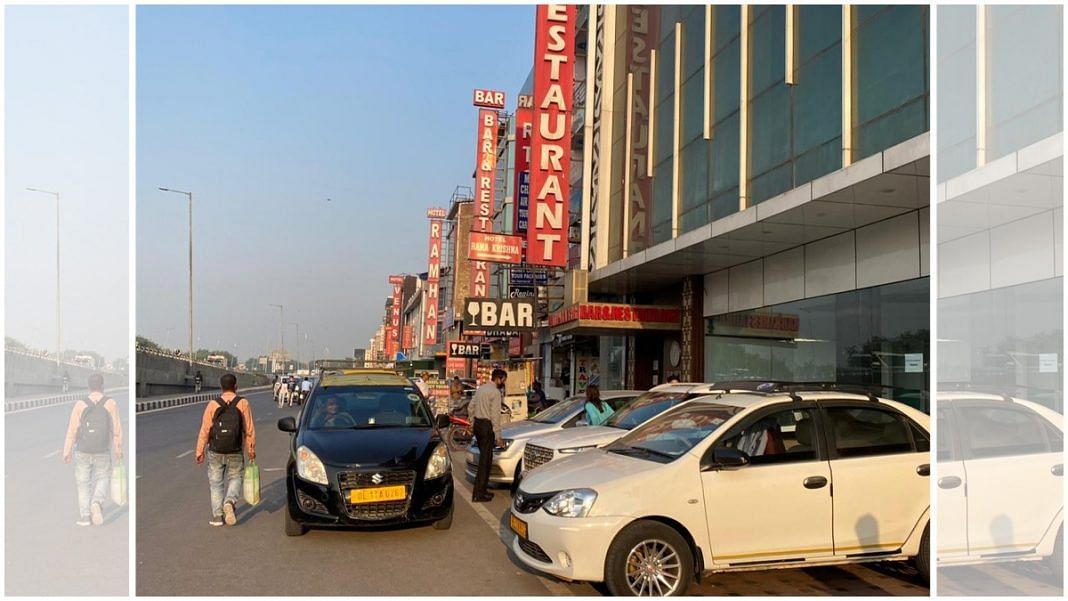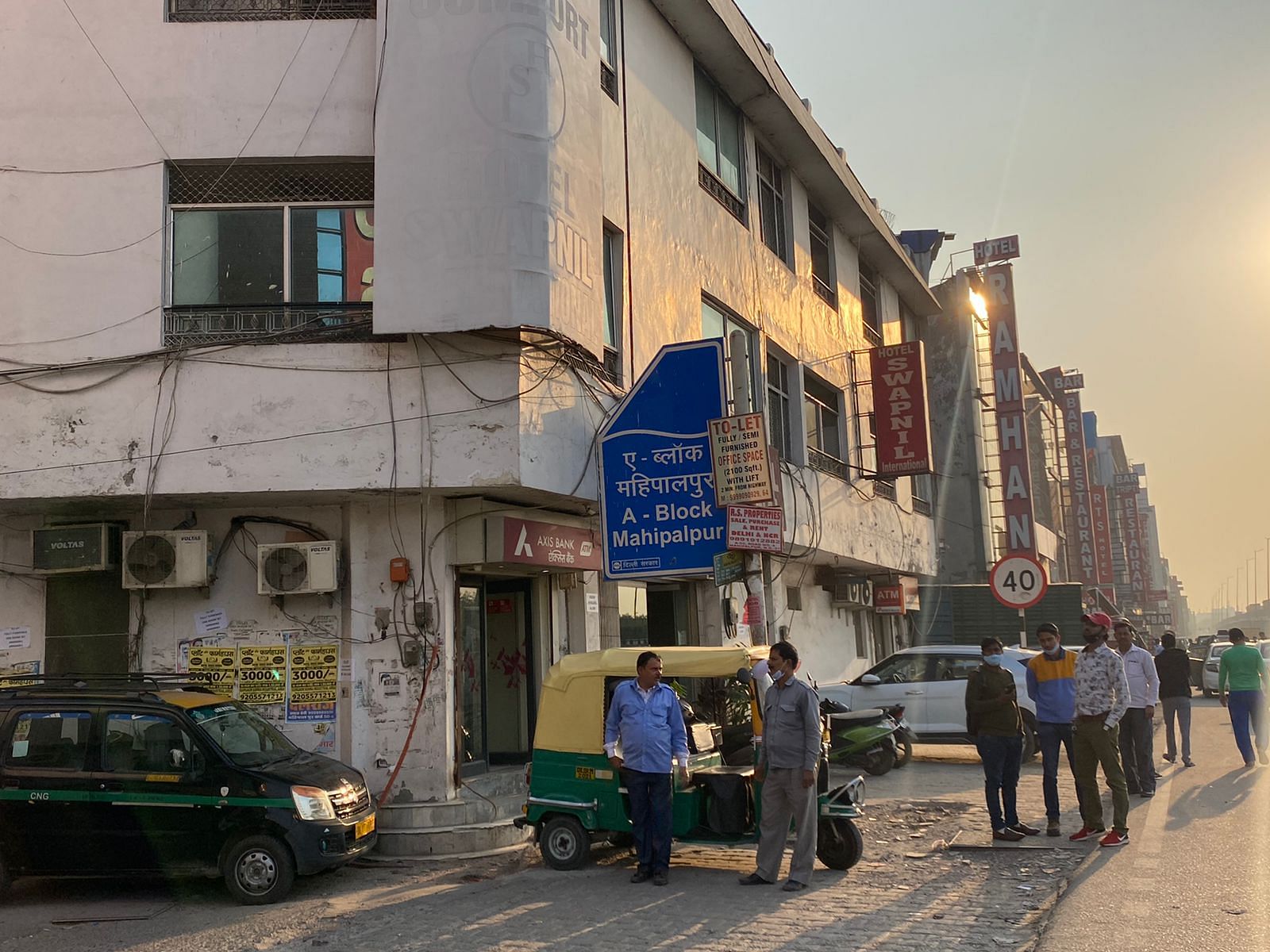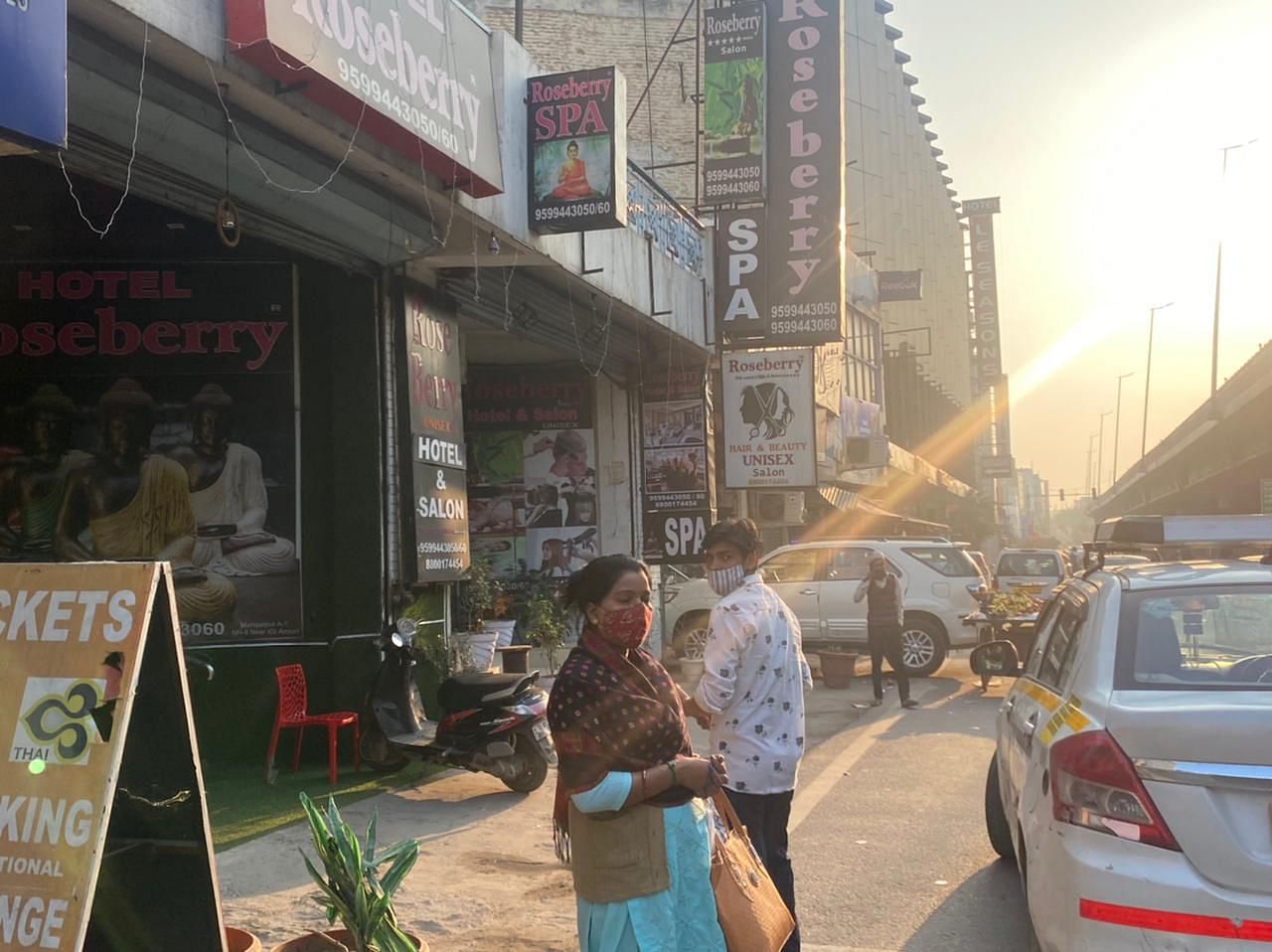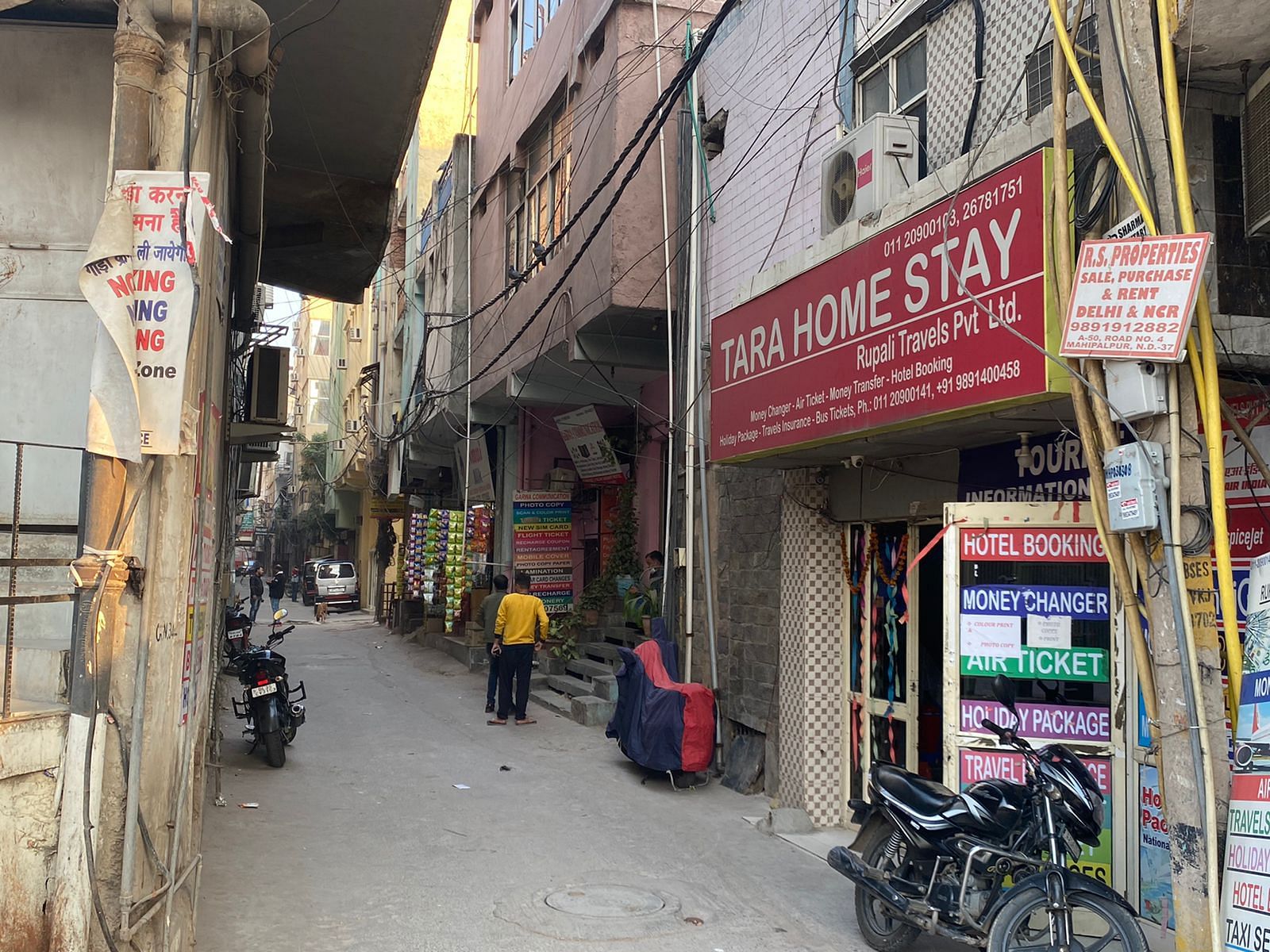
New Delhi: Manju Gadaiwal, a 44-year-old who has been in the beauty industry for years, had more than a few dreams when she set up her own parlour at Delhi’s Mahipalpur in February 2020.
Located near the airport, the site was prime real estate for Gadaiwal, who was counting on business from the constant stream of travellers flying into the national capital. But the Covid lockdown kicked in a month later, and Gadaiwal was left reeling.
Cut to the present, she is working a 10-hour shift seven days a week at a parlour in Vasant Kunj, having shut down her business this July.
She is earning Rs 7,000 per month. In the year and a half after the Covid lockdown, Manju said, she lost all her life savings, while her husband — who, according to her, is mentally unstable — became unemployed as well.
“On 22 February 2020, I opened my own parlour right near the main road in Mahipalpur. I used up my entire savings to open this new business because I wanted to be independent. In a month, the country went into lockdown. On 30 July 2021, I was forced to shut it down and go back to my previous employer,” she told ThePrint.
Mahipalpur lies on the left of NH-8 on the way from Delhi to Gurugram — a narrow 5km stretch of guest houses, hotels, spas and parlours.
“After 8 pm, one does not know if one is in Mahipalpur or Bangkok.”
While the bigger hotels face the road, inside the narrow lanes — where not even a firetruck can enter and the sewers are wide open — is a spray of even smaller, mostly illegal hotels on land from its original owners.
“After 8 pm, one does not know if one is in Mahipalpur or Bangkok,” says B.S. Joon, AAP leader and Bijwasan MLA, whose constituency covers Mahipalpur, one of Delhi’s oldest urban villages dating back to the 14th century.
Like its upmarket neighbour Aerocity, Mahipalpur was intended to cater to clientele from the Indira Gandhi International Airport, looking for a place to stay in and out of the city. Unlike Aerocity though, with its marquee hotels and swish restaurants, the majority of its establishments are allegedly built in violation of building bye-laws, without fire clearances.
The impact of the lockdown has been severe in this belt. According to local hotel owners, only 40 per cent of the over 200 hotels in Mahipalpur survived the pandemic-induced lockdown and are barely breaking even.
The majority of those that shut down met such a fate because tenants abandoned the business in the face of mounting losses and fear of no recovery. Many landowners have not been able to contact them.
Owners and workers seem to be in the same boat, just able to make enough to make ends meet with families to feed. The idea of paying minimum wages — Rs 16,000 per month for unskilled labour, Rs 17,500 per month for semi-skilled and Rs 19,200 per month for skilled — seems impossible. Slashed salaries are now the norm, grudgingly being accepted by desperate employees.

Aerocity is everything Mahipalpur isn’t, or aspires to be. Most of their clientele is from the airport — travellers, staff and embassies. However, in this ‘tale of the two aerocities’, Mahipalpur is mostly undocumented, sitting on illegal land, while Aerocity has its required documentation owned by GMR as it becomes increasingly attractive for investors.
Those investing in Aerocity have deep pockets with enough means for the place to survive the pandemic, while across the highway, owners are just about managing to scrape through, with many abandoning the business.
If Aerocity is considered posh and upscale, then its low-scale counterpart Mahiplapur is ‘shady’ and allegedly a hub of ‘improper activities’ — prostitution, drugs and sale and consumption of illicit liquor.
Also Read: India lost more jobs due to coronavirus lockdown than US did during Depression
Female breadwinners turn to Mahipalpur
Mahipalpur is unique. Besides having a once flourishing hotel industry, it is home to many archaeological sites and water bodies, among them Sultan Garhi, considered Delhi’s first Islamic mausoleum.
The Rangpuri Pahadi slum also falls under this area, home to many of those who work in the spas and hotels along the national highway stretch.

But it doesn’t feature in the master plan prepared by the Delhi Development Authority (DDA) to chart out a road map for the city’s development.
The first master plan was promulgated in 1962 under the Delhi Development Act of 1957. Each plan is designed for a 20-year period.
Much of Mahipalpur falls on land known as ‘Lal Dora’, which was meant for non-agricultural purposes pre-Independence and was separate from agricultural land. In Lal Dora areas, no jurisdiction of municipal or urban development authorities was applicable. Lal Dora land included urban and rural villages such as Mahipalpur, Basant Gaon, Kanjhawala, Najafgarh etc.
Kanjhawala was included in the Master Plan for 2021.
Nearly every lane in Mahipalpur has at least four-five parlours, all of which have a tale of loss to tell. With business having dried up during lockdown, many continue to struggle to pay rent while others have given up.
Many women like Gadaiwal have now had to take over the burden of running a household as the men were laid off owing to the lockdown. Babita Chouhan, who owns Bright Beauty Salon in another such lane of Mahipalpur, is barely able to make ends meet. Her staff strength has come down from four to one, those she let off are struggling to find other sources of income.
“A huge part of our clientele were women who worked at airports and with airlines who have now obviously stopped coming. The clientele that comes now bargain with us. They never want to pay the full amount for any of our services,” Babita, 43, told ThePrint.
Her monthly earnings have come down from Rs 70,000-80,000 per month to just Rs 10,000. She needs at least Rs 20,000 to pay her rent and salaries to keep the business afloat. Even today, she is working in losses and is not able to pay her staff on time and has to take money out of her own pocket.
“It has been very difficult, but I have been finding a way to manage. If this continues, I do not know how I will take care of my family.”
Twenty-three-year-old Kamini was rendered jobless right before the second wave hit and since then has been unable to secure a source of income. “I was training under Babita didi, after which she employed me. I worked for her for a year.”
She is the sole earning member in her family. “My father passed away when I was very young. I don’t even remember when. Since then, the responsibility of taking care of my two sisters, younger brother and my mother has fallen on my shoulders,” she told ThePrint.
“It has been very difficult, but I have been finding a way to manage. If this continues, I do not know how I will take care of my family,” she said.
Added Gadaiwal about the reduced pay: “Humari majboori hai kaam karna, aur unki majboori hai humara fayda uthana (it’s our compulsion to work, and the employers’ compulsion to take advantage).”
Siddhi Pandey, 23, another woman who had to take over her household’s financial burden, used to teach science to Class 10 in Bihar’s Siwan where she would be paid Rs 30,000. But with school closure due to lockdown, she was unable to provide for her family. She then moved to Mahipalpur in August this year, where she now works as an accountant at Hotel Amantran and is paid a third of that amount.
“I am the youngest of six sisters in the family and I have no brother or father, so the responsibility of taking care of my mother falls on me. From earning Rs 30,000 a month, I am now earning Rs 10,000. It is difficult, but that is why I moved to Delhi to provide a better life for my mother,” she told ThePrint.
Also Read: India’s younger workers worst hit by pandemic, women far more vulnerable, EPFO data shows
Mahipalpur’s hotel industry — making do with horrible bosses
Siddhi’s story is not the only one. Many like her have had to leave their hometown after the second Covid wave in search of work to ensure food on the table.
One such person is 19-year-old Akshay Kashyap. Akshay’s father passed away when he was only four and his mother is a tailor in Kanpur. However, Covid dried up all earnings and any hope of work.
With no work and barely enough money to put food on the table, the teenager, having just finished his Class 12 exams, made the near 500km journey to the national capital.
“My day starts at 9 am and ends at 9 pm. I want this to be a temporary thing so I can take care of my mother. My dream is becoming an engineer and doing a BSc.”
Akshay was promised the job of a waiter at one of the hotels in Mahipalpur, where he would earn Rs 8,000 a month. A normal day comprised somewhere between 12-14 hours of work. However, when the month ended, the hotel only allegedly paid him a fraction of the entire amount, Rs 3,000.
The second Covid wave struck and, fearful for his life, Kashyap went back home to take care of his ailing mother who has knots in her neck and head, and the family does not have enough means for regular doctor checkups.
As things opened up, Kashyap returned to Mahipalpur for work and for the money he was owed. However, he was only given Rs 2,000 more as part of the Rs 8,000. Now, the teenager has been working at another hotel as part of room service and also serves as a waiter.
“The hotel has promised me Rs 8,000 as well and they take care of my food and accommodation,” he said. “My day starts at 9 am and ends at 9 pm. I want this to be a temporary thing so I can take care of my mother. My dream is becoming an engineer and doing a BSc. I even took physics in Class 12,” Kashyap added.
While Akshay is a newbie in the industry, many veterans in the hotel industry are also finding it hard to navigate their way in light of Covid.
Rajendra Bhandari, who sits on the front desk at Hotel Portend, has been in the hotel industry for over two decades. Earlier working in the hotels in Paharganj, Bhandari found work in Mahipalpur after the second Covid wave.
With logistics haywire, no fixed timings or holiday, and salaries facing huge cuts, Bhandari is now contemplating leaving this line of work.
“To get one off, I need to pull a 24-hour shift the next day. We have no weekly-offs, no national holidays and if I do not pull a 24-hour shift, I face a salary cut. In this line of work, 80 per cent people work a minimum of 12 hours a day,” he told ThePrint.
If some are contemplating leaving, then some are forced to face exploitative bosses.
Manoj Kumar, who used to work on the front desk at a hotel, said many times he either wasn’t paid a salary or was paid below what he was promised.
“I haven’t been paid a total of Rs 40,000. When I approach my boss, he threatens me. Some have even called the police to get their dues. Despite knowing my boss is bad news, I have no option but to ask him for work. I have a family to feed,” he said.
Also Read: In UP, queue grows for new Covid Warriors course but past ‘Skill India’ trainees await jobs
Hotel owners working in losses
If workers in these hotels are having a bad time, then owners and those who lease these hotels are almost in the same boat.
Reopening hotels that had been shut for months during lockdown proved to be an expensive task. Even now, occupancy remains at an all-time low despite slashed rates.
“I used to think I was the boss, but Covid made me realise I’m merely a daily-wage worker,” he said.
Bobby Lohia, the owner of two hotels in Mahipalpur and member of the Mahipalpur Hotel Association, said he had to take a loan to just pay salaries to his staff and electricity bills and was at present working at a loss.
“I used to think I was the boss, but Covid made me realise I’m merely a daily-wage worker,” he said.
With interest on loans increasing, barely any occupancy in the hotels and no relief from the government, Lohia said the hotel association was a toothless body.
“The Mahipalpur Hotel Association is not at all effective. Due to Covid, no one understands how to deal with this. So many people lost family members and businesses. Everyone is frustrated. We are small-scale business industries. Half of our hotels are illegal so who do we even go and ask for help,” he said.
Echoing him, Ashok Sehrawat — the owner of Vishal Residency — described how it was an uphill task to restart business, with most hotels in dilapidated conditions, pay salaries to staff with no incoming business, and ensure normal safety standards. All of this with no relief from the government or Mahipalpur Hotel Association.
“The problem is that there is no unity among the hotel owners and leasers. So how do we even approach the government in such circumstances? I had to depend on my savings during the lockdown to run my house and take care of my children. We are just about breaking even now.”
Illegal construction spells no scope for relief
Being illegally constructed, many of the hotels in Mahipalpur that faced huge losses during Covid could not avail of relief packages.
Joon told ThePrint that most guest houses and hotels in Mahipalpur were running illegally and the “activities were also not proper”, leaving many residents from the nearby areas perturbed.
Explaining how compliances were bypassed, Joon said many of the hotels were over 12m high, but got clearances from the fire department for being less than 12m high, which exempted them from a fire NOC. Many of the hotels were also in contravention of the building bye-laws, he said.

Joon said in many of the lanes where the hotels are located, a fire truck could not enter and if there was a fire it would be “fatal”.
“These hotels are sitting on a fireball. Over the years, I have written multiple letters to the MCD, fire department and Delhi Police but have got no response. This issue is being neglected. Who will be responsible if there is a fire?” Joon said.
When asked why he could not take up the issue in a bigger way, being the MLA from the region, Joon pointed to the “multiplicity of authority in Delhi”, with Delhi Police coming under the Home Ministry and the municipal corporations being under the Lt. Governor.
“MCD and Delhi Police officials don’t even bother responding to my letters. Even though the chief secretary has said letters by MLAs will be responded to within a week. Even the fire department has been ignoring my letters,” said Joon.
ThePrint accessed letters written by Joon to Delhi home minister Satyendar Jain, deputy commissioner (of police), South West Delhi, and the fire department from December 2020 onwards regarding the fire hazard ay these hotels and the alleged illegal activities taking place in Mahipalpur.
The MLA also said all the hotels were illegally extracting water from the Delhi Jal Board through bore-wells, adding that the BSES was providing them with illegal electricity connections.
“I am worried about any fire incident. It will be very fatal. Fire vehicles cannot enter inside the lanes as it is closed and congested. Traffic movement is being disrupted on the highway due to these hotels. And on top of that, police are not taking appropriate action, they are working in cahoots with those running the illegal activities taking place,” he said.
Reached for comment, South Delhi Municipal Corporation Mayor Mukesh Suryan refused to answer any questions on relief for hotels in Mahipalpur, or their “illegal status”.
He evaded questions about efforts — if any — to help the hotel industry during the lockdown. “The pandemic made everyone’s life very difficult, it wasn’t only hotel owners in Mahipalpur,” he said.
However, he told ThePrint that the area (Mahipalpur) would be included in the Master Plan for Delhi only in 2041.

COMMENTS